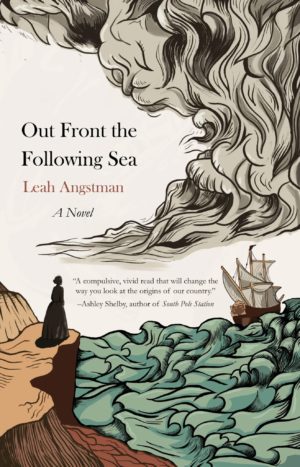You have no items in your cart. Want to get some nice things?
Go shopping
Out Front the Following Sea, Leah Angstman’s debut novel from Regal House Publishing, is a powerhouse feminist epic that transports the reader to a time and place long relegated to lore before the narrative even begins, with its inclusion of meticulous maps of 17th-century New England villages and a diagram of the Primrose ship, all of which figure prominently in the story. Angstman paints an authentic and stark portrait of Colonial America, when witch hunts and the plague terrorised settlers and violent conflicts between factions and nations alike were a constant threat. Indeed, authenticity in the language, setting, and mores of the epoch, while delivering a female protagonist who is both of and ahead of her time, is what is most impressive about Out Front the Following Sea, a finalist in the 2020 Chaucer Book Awards for Pre-1750s Historical Fiction.
The story follows Ruth Miner, a headstrong teenage orphan with a thirst for science and literature and an unflinching scepticism of organised religion, as she navigates her harsh world of 1689 New England, a world in which toxic Christianity, superstition, and fear of the unknown relegate eccentrics and the idiosyncratic, especially females and Native Americans, to outcasts and, in Ruth’s case, something far more sinister. After Ruth is erroneously blamed for her parents’ deaths in a house fire when she was a child, she is literally branded a witch and stands accused of any and all misfortunes that befall the village, including an early frost that prematurely kills the harvest. In the novel’s opening, Ruth ventures to the marketplace in search of food for herself and her dying grandmother and is rebuffed by the villagers at every turn:
“‘Ga weg! Ye’ll starve for what I care of it,’ Mrs. Pieterszoon said. ‘Ye shrivel them parsnips like ye shriveled the rest of the crop, and ye’ll be eating a coring iron.’
“The woman’s chin jutted, a landing rock that ships could spy from sea, and Ruth hastened along to Mrs. Janszoon at the next cart, who wouldn’t deign to reply but threw a sheet over the vegetables. Ruth groaned and continued down the line. A father covered his son’s eyes; a group of mothers lowered their shawls over their baskets, hurrying their daughters and goats on by. From the upper window of a brick one-and-half story Dutch colonial, a wealthy merchant’s daughter laughed at Ruth, then slammed the shutter.”
The scene is reminiscent of Nathaniel Hawthorne, and one is immediately struck by the care Angstman took in creating period dialogue and narration. In lesser hands, the writing might have slipped into caricature or melodrama, but Angstman is always in control, driving the story with lush prose at a steady pace to its ultimate conclusion. It is a tale of romance, adventure, and historical fiction that will appeal to a vast audience.
The romance element presents itself early with the arrival of Primrose First Mate, Owen Townsend, Ruth’s childhood friend for whom she took the blame for her parents’ deaths in order to protect him. A guilt-ridden Owen has since made a practice of purloining various items, including books, from his ship’s cargo to give to Ruth as reparations whenever he sporadically docks in her village. After Ruth’s grandmother dies and it becomes clear it is no longer safe for her to remain in Shrewsbury because the villagers intend to execute Ruth for witchcraft, Ruth stows away on Owen’s ship and their relationship begins to blossom. Angstman’s knowledge of seafaring language and details is extraordinarily notable in these scenes, further exhibiting her painstaking research.
While Owen and Ruth’s developing romance, fraught with obstacles imposed on them by the viciousness of their time and circumstances, is fascinating to follow, the crux of the novel is in observing Angstman’s resilient heroine, Ruth Miner, develop as a fiery feminist who challenges the period’s restrictive views by defying convention at every turn, insisting on relying on reason rather than superstition in solving problems, challenging the status quo by attempting to purchase land on which to build a house with her own two capable hands, illegally befriending a Native American man named Askook and learning his language and traditional herbal remedies, and using her wits to save herself from ruin time and time again rather than relying on a man’s protection. Ruth even turns her undeserved reputation as a witch to her advantage at one point when she is faced with peril from a lascivious sailor aboard the Primrose: “‘Stay back. I…I’m a witch!’” Ruth exclaims. “‘I’ve cursed a town to unsavory ends, and I’ll do the same to you and your ship.’”
Leah Angstman’s Out Front the Following Sea is a sweeping tale of female triumph over Colonial America’s chokehold on gender roles that, as Ashley Shelby, author of Muri, South Pole Station, and Red River Rising, posits, “establishes her as one of the most exciting young novelists in the country.”
Out Front the Following Sea
By Leah Angstman
Regal House Publishing, 334 pages

About Christy Hallberg
Christy Alexander Hallberg is a Teaching Professor of English at East Carolina University, where she earned her BS and MA in English. She received her MFA in Creative Writing from Goddard College. In addition to her teaching duties, she is Senior Associate Editor for North Carolina Literary Review. She has published short stories and creative nonfiction with Rock music themes in such journals as Main Street Rag, Fiction Southeast, Riggwelter, Eclectica, Solidago, STORGY Magazine, and Concho River Review. Her first novel, Searching for Jimmy Page, is forthcoming from Livingston Press.




